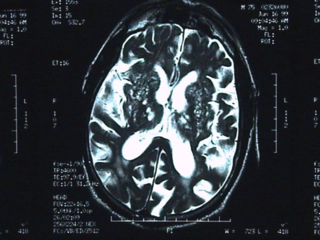Dementia
What Is Vascular Dementia?
Strokes can cause dementia—and some strokes are silent.
Posted April 27, 2019 Reviewed by Davia Sills
Vascular dementia is dementia due to strokes; vascular cognitive impairment is mild cognitive impairment due to strokes.
Strokes, also called vascular or cerebrovascular disease, occur when an artery sending blood from the heart to the brain becomes blocked off; that part of the brain doesn’t receive enough blood and dies. Because the problem is related to blood vessels, strokes are often called “vascular disease” or sometimes “cerebrovascular disease” to emphasize the problem is with blood vessels of the brain or “cerebrum.”

Although individuals and family members usually notice major strokes from the blockage of large arteries right away, tiny strokes from the blockage of small and microscopic arteries in the brain are typically silent. A brain imaging study, such as an MRI or CT scan is needed to see these small-vessel disease strokes. It is only when large numbers of these tiny strokes accumulate that they cause problems with thinking and memory.
Most people have a handful of tiny strokes by the time they are in their 70s and 80s. These tiny strokes are generally too small to cause dementia all by themselves, but they can make thinking and memory worse when other disorders, such as Alzheimer’s disease, are present.
Some people have many more of these tiny strokes, or they may have a number of medium or large strokes. When strokes are the primary cause of thinking and memory problems, we use the term “vascular dementia” if the daily function is impaired, and “vascular cognitive impairment” if the daily function is normal.
If your loved one has any of the risk factors in the list below, they are at increased risk for strokes. The good news is that, with the exception of age, you can help them take charge of their life and reduce their risk of strokes.
Work with their doctor to make sure that their medical conditions are under good control. If they are smoking, encourage them to quit today. Help them exercise for better health, eat a healthy diet, and keep a healthy weight. If they drink alcohol, make sure they drink in moderation: no more than one drink per day.
Major risk factors for strokes
Medical factors
- Prior stroke
- Prior stroke warning sign (transient ischemic attack or “TIA”)
- Heart disease
- A disease of other blood vessels of the body
- Diabetes
- High cholesterol
- High blood pressure
Lifestyle factors
- Smoking
- Sedentary lifestyle
- Unhealthy diet
- Obesity
- Alcohol: more than one drink per day
Uncontrollable factors
- Old age: after age 55, the stroke risk doubles every decade
It is common to have both Alzheimer’s disease and small strokes in the brain after age 70. When strokes are the only cause of thinking and memory problems, there are usually clinically apparent, large-vessel strokes affecting strength, sensation, balance, walking, speech, or vision in the weeks, months, or years preceding dementia. When there is no history or suspicion of strokes, and silent strokes are found incidentally on the MRI or CT scan, the cause of the cognitive impairment is typically small-vessel strokes plus Alzheimer’s disease or another disorder.
Q: You’ve seen your loved one’s MRI report, and it says they have “scattered T2 hyperintensities consistent with microvascular ischemic disease.” What does that mean?
A: That’s a doctor’s way of saying that there is something on the MRI scan that looks like tiny, small-vessel strokes.
Q: Your loved one has never had a stroke, yet the doctor says they did, and she can see it on the MRI scan. How can that be?
A: Many strokes—especially small ones—are “silent,” meaning that they may not cause any noticeable symptoms.
© Andrew E. Budson, MD, 2019, all rights reserved.
References
Budson AE, O’Connor MK. Seven Steps to Managing Your Memory: What’s Normal, What’s Not, and What to Do About It, New York: Oxford University Press, 2017.
Budson AE, Solomon PR. Memory Loss, Alzheimer’s Disease, & Dementia: A Practical Guide for Clinicians, 2nd Edition, Philadelphia: Elsevier Inc., 2016.


